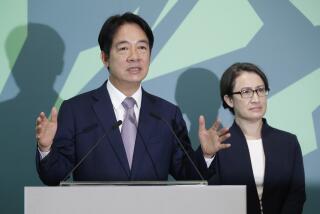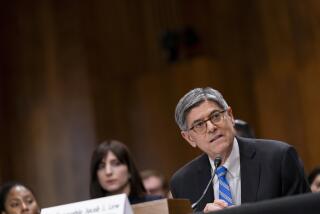Mondale Is Selected for Japan Post : Diplomacy: Clinton praises ex-vice president’s qualifications for job as ambassador. U.S., Tokyo negotiators note progress in trade talks.
- Share via
WASHINGTON — President Clinton nominated former Vice President Walter F. Mondale as his ambassador to Japan Friday, as U.S. and Japanese negotiators embarked on what they later said was a “productive” opening to potentially contentious trade talks.
Clinton introduced his new envoy to Tokyo at a Rose Garden ceremony Friday morning, praising the 65-year-old Minnesotan as “a leader of enormous wisdom, courage, compassion and stature.”
Clinton said there is “no more important bilateral relationship in the world” than that between the United States and Japan but described economic relations between the two countries as often troubled.
“The economic pillar of our relationship needs some repair,” he said. “I think we all know that.”
Mondale said that the destinies of America and Japan have become inseparable. He also noted that the relationship is more than merely mercantile. The two countries continue to share critical security concerns in East Asia and will need to cooperate on global economic development issues.
The U.S.-Japanese talks Friday and today are intended to produce a framework for improving trade negotiations between the two countries over the next four years, with the ultimate goal of agreeing on a course that will reduce Japan’s burgeoning global trade surplus, which reached $132 billion last year, and open Japanese markets to greater imports.
In a coordinated demonstration of amity, officials from both delegations said that they expect to meet again in Tokyo on June 27 and 28 and to complete the discussions in time for Clinton and Japanese Prime Minister Kiichi Miyazawa to announce a new approach when Clinton attends a summit of the leading industrial democracies in Tokyo in July.
“The tone of the meeting was very positive,” said a Japanese official, speaking on condition of anonymity under ground rules set by the two delegations.
“We want to make some real progress on these very thorny trade difficulties that have proved to be so resistant to change,” the President said. “I think we’ve got a real shot to reach an agreement here.”
The Administration’s goal is to see Japan’s trade surplus cut in half and its purchases of foreign goods increased by one-third within four years. The White House is focusing on five areas: Japan’s auto and auto parts industry, government purchases by Japan, compliance with existing trade agreements, regulatory reform and the economic integration of U.S. companies into the tightly controlled world of Japanese commerce.
The talks were to continue over dinner, to which the Administration invited several top executives of U.S. companies facing difficult problems cracking the Japanese market. Among them were Harold A. Poling, chairman of Ford Motor Co.; George Fisher, chairman of Motorola; John Sculley, chairman of Apple Computer; Maurice Greenberg, chairman of American International Group, the country’s largest insurance underwriter, and John Reilly, president of the automotive parts division of Tenneco Inc.
The appointment of Mondale was welcomed in status-conscious Japan, where he is seen as appropriately eminent to reflect the importance of the Washington-Tokyo bond.
Japanese officials also privately applauded the departure this summer of the current ambassador, Michael H. Armacost, 55, a career diplomat. When Armacost was appointed four years ago, some Japanese expressed disappointment that he was not the prominent political figure they had expected.
Mondale may be bringing an unwelcome change of tone to Tokyo in the form of the emerging Clinton Administration trade policy--a demand for results in ongoing efforts by American manufacturers and service companies to penetrate the historically closed Japanese market.
As a presidential candidate in 1984, Mondale took a hard line on Japanese trade practices and was an unapologetic supporter of labor-supported “domestic content” legislation that would have required foreign auto makers to use specified percentages of American-made parts in all cars sold here.
Mondale said Friday that Clinton’s pledge to reduce the budget deficit “seems to me to open up new opportunities for cooperation on trade matters.”
Times staff writer Leslie Helm, in Tokyo, contributed to this story.
More to Read
Sign up for Essential California
The most important California stories and recommendations in your inbox every morning.
You may occasionally receive promotional content from the Los Angeles Times.










